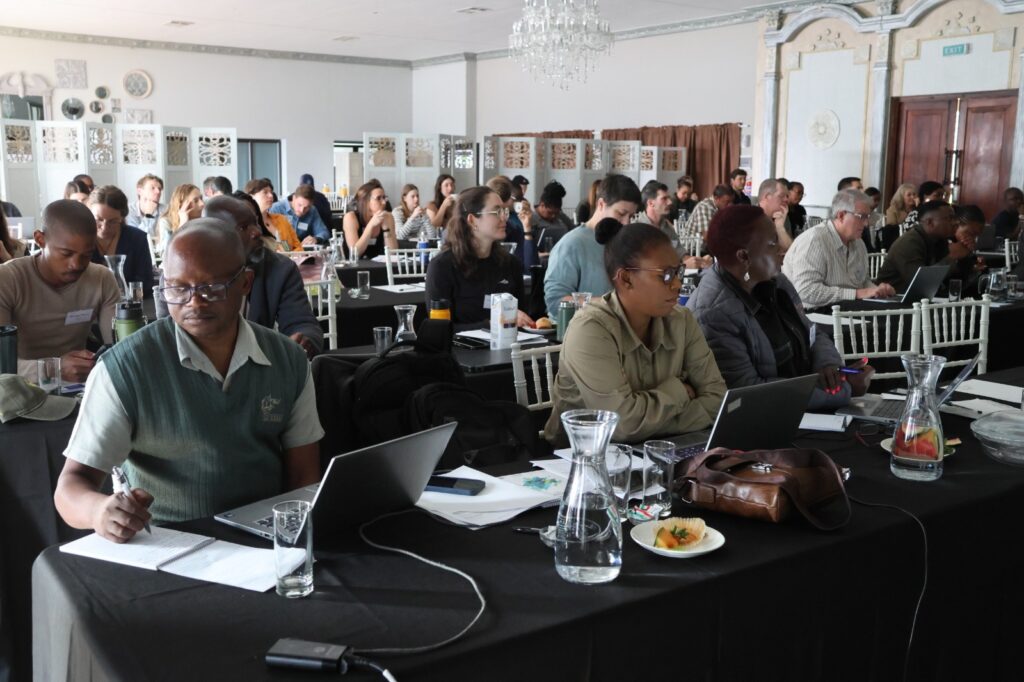 The Garden Route Interface Network Meeting (GRIN) held at Knysna photo supplied
The Garden Route Interface Network Meeting (GRIN) held at Knysna photo supplied
By JP Louw
SANParks Head of Communications and Spokesperson
The Garden Route Interface Network Meeting (GRIN) concluded three days of robust discussion, knowledge sharing and learning at Villa Castollini, Brenton-on-Sea in Knysna on Thursday.
Hosted from 30 September to 2 October 2025, the gathering provides a platform for authentic conversations and engagement across conservation’s many and diverse human and nature dimensions and interfaces.
There were more than 60 presentations and 5 hours of discussions with contributions from practitioners, conservation managers and researchers learning together to care for earth’s social-ecological systems.
GRIN was established as a neutral “third space” where the worlds of research, policy, and practice converge.
It provides a platform where evidence-based science and practical experience are brought together in honest dialogue and humble joint exploration of the complex challenges facing people and nature.
This unique positioning has allowed GRIN to serve not only as a hub for knowledge sharing, a community of social learning, but also as a catalyst for partnerships that extend well beyond the meeting.
This year’s gathering was structured around three primary themes: the evolving nature of conservation and human–nature interactions, reflection and knowledge exchange, and co-learning, engagement and collaboration. Sessions covered a wide range of subjects, including inclusive conservation, land-use dynamics, cultural perspectives on biodiversity, management effectiveness tools, monitoring and evaluation, responding to drivers of environmental change, environmental stewardship, transdisciplinary learning, community-driven conservation and transformative change. In addition, members engaged in discussions on co-learning initiatives, collaborative platforms, and the role of participatory communication in reducing conservation conflict.
The meeting closed with invited reflections on GRIN 2025 in the spirit of reflexive evaluation and learning which is so much part of this community of practice.
GRIN 2025 highlights the need to embed inclusivity and equitability at the heart of land and sea-scape scale societal environmental stewardship and conservation for positive human-nature outcomes and futures.
Discussions underscored the importance of relationally-embedded monitoring, evaluation, and learning across institutions and stakeholders.
There was broad recognition that contemporary challenges such as climate change, biodiversity loss, and land-use pressures require humble, innovative and participatory approaches that combine multiple forms of knowledge and knowing.
The meeting also reaffirmed that strong relationships and partnerships between researchers, policymakers, and practitioners remain central to shaping both this meeting and sustainable futures.
The meeting was hosted by South African National Parks (SANParks) in collaboration with Nelson Mandela University, Rehabs International Research Laboratory, the French CNRS and Society for Social Ecological Systems. Through this partnership, GRIN continues to embody the principles of SANParks’ Vision 2040, which calls for a thriving society in harmony with nature.
The insights and connections forged during the meeting will contribute directly to advancing that vision, ensuring that conservation is both inclusive and future-oriented.
The 7th GRIN meeting has reinforced SANParks’ position in support of respectful collaborative learning to navigate the interface of diverse human-nature systems and values.
This helps bridge across and overcome ‘the monocultures of the mind’ through sharing experiences and ensuring that conservation remains both relevant and responsive to the needs of society and the environment.
Tshwane Talks readers have been able to read stories in this publication for free for over two years now. We still want our readers to access our stories for free, but we are asking those among our readers who can afford it to contribute at least R30 a month to cover some of the costs of publishing this independent, non-aligned online newspaper which gives a voice to all sectors of society irrespective of race, colour, creed, religion, or political affiliation. You may make your contribution by depositing at least R30 a month into Tshwane Talks' bank account. Details are as follows:
Bank Details
Bank: Standard Bank
Account Number: 10225548834
Account Type: Cheque Account